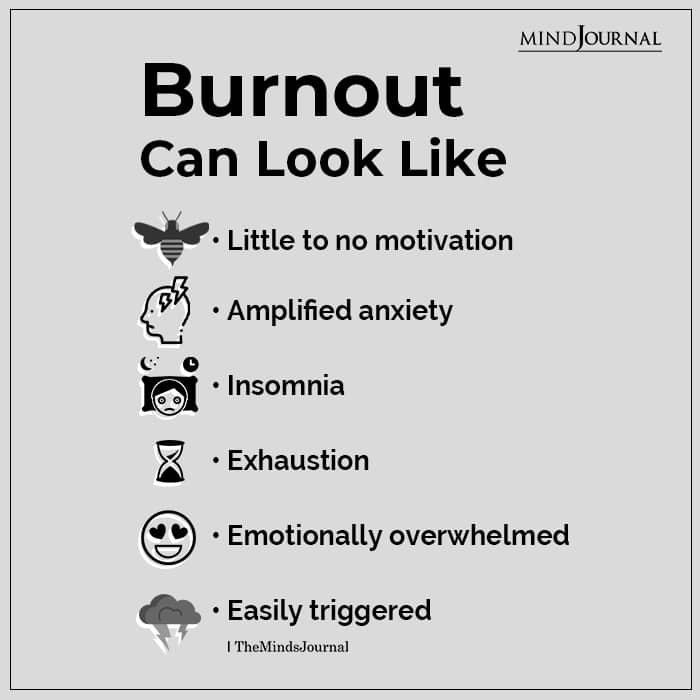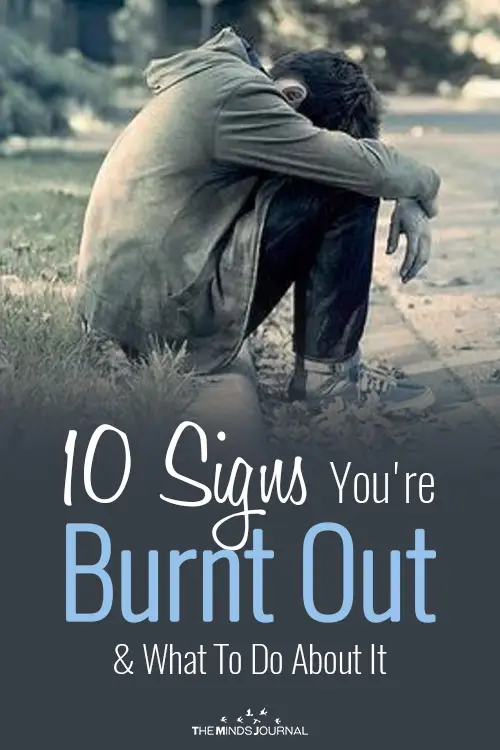It is a state of chronic stress that feels like a hazard and is mostly experienced by passionate high-achievers. Working with heavy workloads and exceptionally long hours constantly can put great pressure on you leading to full-fledged burnout. And soon you start to feel that you can’t function properly any longer, whether in your career or your personal life.
“Burnout is what happens when you try to avoid being human for too long.” – Michael Gungor
However, this does not occur out of the blue. Our mind and body often send us signals and warnings that something is wrong. All we need to do is pay attention before it’s too late.
“Burnout is nature’s way of telling you, you’ve been going through the motions your soul has departed; you’re a zombie, a member of the walking dead, a sleepwalker. False optimism is like administrating stimulants to an exhausted nervous system.” – Sam Keen
The emotionally intelligent way to avoid burning out
Even the best jobs can lead to burnout. The harder you work and the more motivated you are to succeed, the easier it is to get in over your head.

The prevalence of burnout is increasing as technology further blurs the line between work and home. New research from the American Psychological Association and the National Opinion Research Center at the University of Chicago reported the following:
- 48% of Americans experienced increased stress over the past 5 years
- 31% of employed adults have difficulty managing their work and family responsibilities
- 53% say work leaves them “overtired and overwhelmed.”
A Society for Human Resource Management (SHRM) poll found that “burnout from my current job” was one of the top reasons that people quit.
Burnout can get the better of you, even when you have a great passion for your work. Arianna Huffington experienced this first hand when she almost lost an eye from burnout. She was so tired at work that she passed out, hitting her face on her desk. She broke her cheekbone and had to get four stitches on her eye.
“I wish I could go back and tell myself that not only is there no trade-off between living a well-rounded life and high performance, but performance is also actually improved when our lives include time for renewal, wisdom, wonder, and giving. That would have saved me a lot of unnecessary stress, burnout, and exhaustion.” – Arianna Huffington
Burn out often results from a misalignment of input and output; you get burnt out when you feel like you’re putting more into your work than you’re getting out of it. Sometimes this happens when a job isn’t rewarding, but more often than not it’s because you aren’t taking care of yourself.
Before you can treat and even prevent burnout, you need to recognize the warning signs so that you’ll know when it’s time to take action. Here they are, in no particular order.
Ten Signs You’re Burning Out

1. Health problems.
Burnout has a massive, negative impact on your physical and mental health. Whether you’re experiencing back pain, depression, heart disease, obesity, or you’re just getting sick a lot, you need to consider the role your work is playing in this. You’ll know when burnout is affecting your health, and you’ll just have to decide whether your approach to work is worth the consequences.
2. Cognitive difficulties.
Research shows that stress hammers the prefrontal cortex, the part of the brain responsible for executive function. Executive function impacts your memory, decision-making abilities, emotional control, and focus. When you notice that you’re making silly mistakes, forgetting important things, having outbursts of emotion, or making poor decisions, you’re likely burning out.
3. Difficulty with work and personal relationships.
Stress bleeds over into everything you do, particularly how you interact with people. Even when you feel that you’re keeping your stress under control at work, it can rear its ugly head at home. Often it’s your relationships that suffer. Stress makes many people more likely to snap at others, lose their cool, and get involved in silly, unnecessary conflicts. Others are more inclined to withdraw and avoid people they care about.
Read 6 Warning Signs You’re About to Burn Out at Work
4. Taking your work home with you.
You know that sickening feeling when you’re lying in bed thinking about all the work that you didn’t get done and hoping that you didn’t miss something important? When you can’t stop thinking about work when you’re at home, it’s a strong sign that you’re burning out.
5. Fatigue.
Burnout often leads to exhaustion because of the toll stress takes on your mind and body. The hallmarks of burnout fatigue are waking up with no energy after a good night’s sleep, drinking large amounts of caffeine to get you through the day, or having trouble staying awake at work.
“Burnout is not the result of doing too much; it is the result of not getting enough rest.” -John Patrick Hickey
6. Negativity.
Burnout can turn you very negative, even when you’re usually a positive person. If you find yourself focusing on the downside of situations, judging others, and feeling cynical, it’s clear that negativity has taken hold and it’s time for you to do something about it.
Read 4 Easy Ways To Let Go Of Negativity From Your Life And Find Happiness
7. Decreased satisfaction.
Burnout almost always leads to a nagging sense of dissatisfaction. Projects and people that used to get you excited no longer do so. This dip in satisfaction makes work very difficult because no matter what you’re putting into your job, you don’t feel like you’re getting much out of it.
8. Losing your motivation.
We begin jobs in a honeymoon phase, seeing everything through rose-colored glasses. When you’re in this phase, motivation comes naturally. In a burnout state, you struggle to find the motivation to get the job done. You may complete tasks, and even complete them well, but the motivation that used to drive you is gone. Instead of doing work for the sake of the work itself, your motivation stems from fear—of missing deadlines, letting people down, or getting fired.
9. Performance issues.
People who burn out are often high achievers, so when their performance begins to slip, others don’t always notice. It’s crucial to monitor your slippage. How were you performing a month ago? Six months ago? A year ago? If you see a dip in your performance, it’s time to determine if burnout is behind it.
Read Burnout: 6 Signs You’re Ready To Hit The Wall
10. Poor self-care.
Life is a constant struggle against the things that feel good momentarily but aren’t good for you. When you experience burnout, your self-control wanes and you find yourself succumbing to temptations more easily. This is largely due to the way that stress compromises your decision-making and self-control and also partially due to lower levels of confidence and motivation.
Fighting Burnout
“In dealing with those who are undergoing great suffering, if you feel “burnout” setting in, if you feel demoralized and exhausted, it is best, for the sake of everyone, to withdraw and restore yourself. The point is to have a long-term perspective.” – Tenzin Gyatso
If you recognize many of these symptoms in yourself, don’t worry. Fighting burnout is a simple matter of self-care. You need good ways to separate yourself from your work so that you can recharge and find balance. The following will help you to accomplish this.
1. Disconnect.
Disconnecting is the most important burnout strategy on this list, because if you can’t find time to remove yourself electronically from your work, then you’ve never really left work.
Making yourself available to your work 24/7 exposes you to a constant barrage of stressors that prevent you from refocusing and recharging. If taking the entire evening or weekend off from handling work e-mails and calls isn’t realistic, try designating specific times to check in on emails and respond to voicemails.
For example, on weekday evenings, you may check emails after dinner, and on the weekend you may check your messages on Saturday afternoon while your kids are playing sports. Scheduling such short blocks of time alleviates stress without sacrificing your availability.
2. Pay attention to your body signals.
It’s easy to think that a headache is the result of dehydration, that a stomachache is the result of something you ate, and that an aching neck is from sleeping on it wrong, but that’s not always the case. Oftentimes, aches and pains are an accumulation of stress and anxiety. Burnout manifests in your body, so learn to pay attention to your body’s signals so that you can nip burnout in the bud. Your body is always talking, but you have to listen.
3. Schedule relaxation.
It’s just as important to plan out your relaxation time as it is to plan out when you work. Even scheduling something as simple as “read for 30 minutes” benefits you greatly. Scheduling relaxing activities makes certain they happen as well as gives you something to look forward to.
Read 5 Tips to Relax When You’re Addicted To Being Busy
4. Stay away from sleeping pills.
When I say sleeping pills, I mean anything you take that sedates you so that you can sleep. Whether it’s alcohol, Nyquil, Benadryl, Valium, Ambien, or what have you, these substances greatly disrupt your brain’s natural sleep process. Have you ever noticed that sedatives can give you some really strange dreams?
As you sleep and your brain removes harmful toxins, it cycles through an elaborate series of stages, at times shuffling through the day’s memories and storing or discarding them (which causes dreams). Sedation interferes with these cycles, altering the brain’s natural process. Anything that interferes with the brain’s natural sleep process has dire consequences for the quality of your sleep, and you need adequate, quality sleep to avoid burnout.
The No. 1 cause of burnout is doing the same thing over and over again and not seeing results.” – Steve Kaczmarski
5. Get organized.
Much of the stress we experience on a daily basis doesn’t stem from having too much work; it stems from being too disorganized to handle the work effectively. When you take the time to get organized, the load feels much more manageable.
6. Take regular breaks during the workday.
Physiologically, we work best in spurts of an hour to an hour and a half, followed by 15-minute breaks. If you wait until you feel tired to take a break, it’s too late—you’ve already missed the window of peak productivity and fatigued yourself unnecessarily in the process.
Keeping to a schedule ensures that you work when you’re the most productive and that you rest during times that would otherwise be unproductive.
Read How To Recover From Burn out When You Feel Unmotivated
7. Lean on your support system.
It’s tempting to withdraw from other people when you’re feeling stressed, but they can be powerful allies in the war against burnout. Sympathetic family and friends are capable of helping you. Spending time with people who care about you helps you to remove yourself from the stresses of work and reminds you to live a little and have fun.
Bringing It All Together
If these strategies don’t work for you, then the problem might be your job. The wrong job can cause burnout in and of itself. In that case, you’ll have to decide what’s more important: your work or your health.
Written by Dr. Travis Bradberry
Originally appeared in The Goodmen Project
“Burnout is a way of telling you that your form of activism was perhaps not very full circle.” – Gloria Steinem
Here’s an excellent video to help you cope with burn out:
Are you experiencing a burnout?
Then take out some time for yourself and evaluate the amount of career and personal life-related stress you have in your life. It is imperative that you pay attention to the signs mentioned above and start working on reducing your burnout before it becomes too late. The sooner you start making small changes to your lifestyle, the better you will be able to cope with it. So get started now while you still have some energy left to fight it and steer your life in the direction you want.
How do you beat burnout? Please share your thoughts in the comments section below, as I learn just as much from you as you do from me.














Leave a Reply